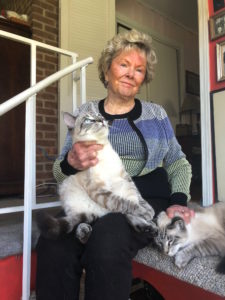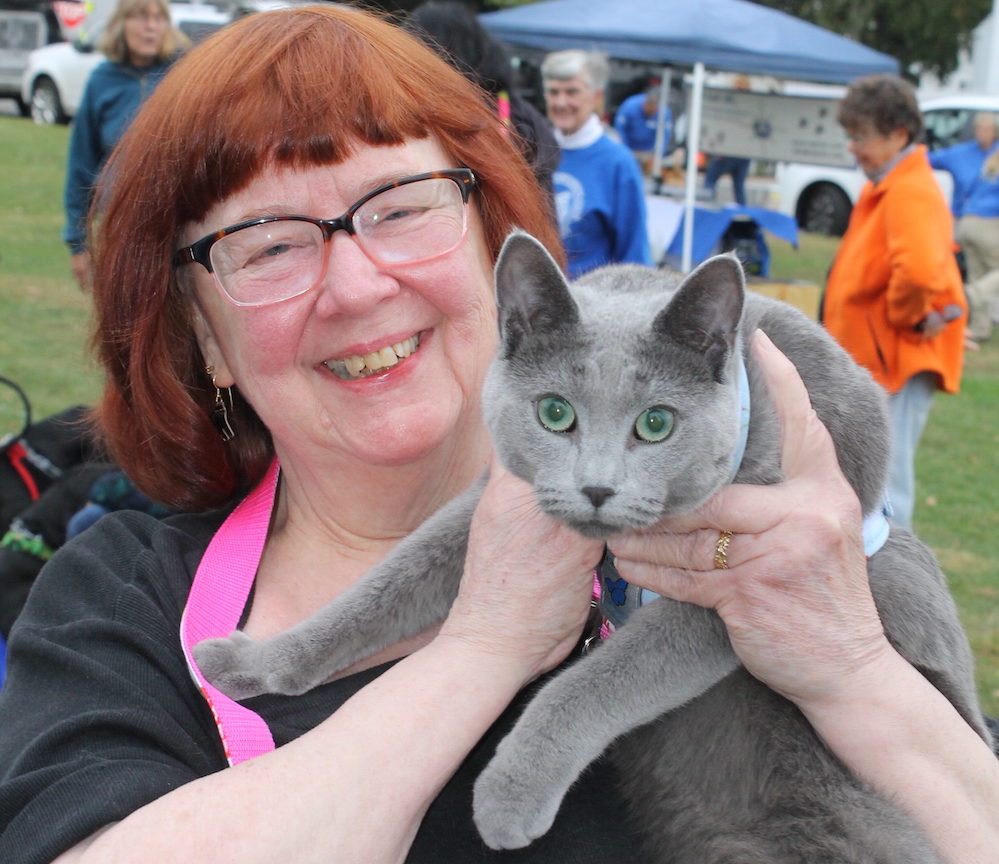When you’re a cat lover, age is not a factor. Whether you are 20 or 80, the soft fur and reassuring purr bring endless joy.
So, if you’ve had cats your entire life, the prospect of living without them is unthinkable. But with some forethought and planning, there’s no reason why you should deny yourself the pleasure of their companionship.
It’s been shown that animal companionship goes a long way toward alleviating depression and loneliness, lowering blood pressure, increasing heart attack survival. A study from back in 2003, “Pets and the Aging: Science Supports the Human-Animal Bond,” documented the benefits of interactions between people and pets, even with animal-assisted therapy. Statistics have shown that people with pets who have had heart attacks live longer than those who don’t have pets.
Eunice Lasala has spent many years rescuing abandoned cats and maintaining community colonies. Naturally, that resulted in many cats over the years by virtue of her rescue work. However, for the first time in her life –she just turned 80 – she got to choose a feline companion, two in fact.
years by virtue of her rescue work. However, for the first time in her life –she just turned 80 – she got to choose a feline companion, two in fact.
“After all the work I’ve done with feral cats, it was time to choose someone for myself.”
Her two boys, Ralphie and Alphie, are 8-month-old Birman mixes. “When they look up at me with those big blue eyes, I just melt,” she says, adding that they are “gorgeous, frisky, and active, and lots of fun.” Lasala also has two other cats, ages 10 and 11.
Dr. Edward Creagan, a Mayo Clinic oncologist, describes a surge of hormones deep within the brain that invoke a sense of peace, serenity, and tranquility when interacting with a pet.
Cat Versus Dog
It’s assumed that cats are “easier” than dogs – they don’t have to be walked, or potty-trained or go to training class, or be bathed. All that is good if you have physical limitations or if you’re thinking about getting your first cat. Those basics may be true, but that does not translate to benign neglect. A cat responds in kind to the amount of interaction you provide. The more time you spend playing with, petting, grooming, and, yes, talking to your cat, the more she will respond and become bonded to you. If you’re older, you have that time to invest.
There are indeed housekeeping duties that can’t be overlooked – especially the litter box. If your back or knees are creaky, check out the many automated litter boxes on the market. While they may make scooping easier, there are still receptacles to empty and scattered litter to vacuum. Depending on your cat’s “style” of urinating, there may be overshoot to clean up.
It goes without saying that you don’t want to place the box in the basement. That involves stairs and the aforementioned creaky knees can make cleaning and scooping more difficult, plus most cats don’t like the basement bathroom option.
Kitten Versus Adult
The charm of a kitten is undeniable, but an active kitten may be a trip hazard; biting and scratching may be a problem. A well-socialized adult cat will still have spirit, enjoy playing, and be a devoted companion.
Take your time when making your choice. If you go to a shelter, get to know the different cats and their personalities; shelter workers are good at sizing up their charges. If you opt for a purebred, choose one that matches your lifestyle – a Persian is sedate, but requires regular grooming, an Abyssinian is high-energy, and a Russian Blue bonds securely with her owner. Get to know the breeder. She can match her cats with your needs. What’s more, a reputable breeder will not release her kittens before they are 4 or 5 months old. They will still be “kitten cute” but have learned their manners from their littermates.
Financial Concerns
The costs of food and litter are a given, but don’t forget the cost of veterinary care. Even the healthiest housecat needs regular check-ups and any cat can experience a serious health problem. Consider investing in pet health insurance to ensure you can meet the costs of emergency care if needed.
Finally, there’s the likelihood that your cat may outlive you. Cats can live as long as 15 or 20 years. You may not want to go there, but think about who will care for your cat if you can’t. Do you have a trusted friend who will agree to take her? Have you made arrangements with the breeder? Be sure to include your veterinarian in those discussions and consider establishing a trust for their care.
A little more than a year ago, Sofiya joined my husband and me and our two other cats. Yes, we’re of that age. I’ve had Russian Blues for more than 30 years, and looking at photos of kittens from a friend who is a breeder, I just had to have one more. Tekla, our other Russian Blue is 17, and I can’t imagine life without one… or two.
Sofiya has brought us incredible joy. She gets along perfectly with our other cats. And when I wake up in the morning with her curled under the covers against my legs, I know that age doesn’t matter when it comes to loving my cats.
This article was reviewed/edited by board-certified veterinary behaviorist Dr. Kenneth Martin and/or veterinary technician specialist in behavior Debbie Martin, LVT.








